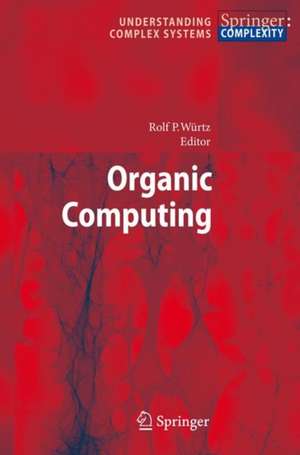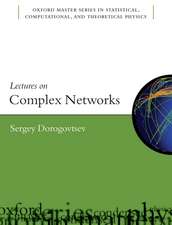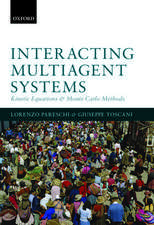Organic Computing: Understanding Complex Systems
Editat de Rolf P. Würtzen Limba Engleză Hardback – 28 mar 2008
| Toate formatele și edițiile | Preț | Express |
|---|---|---|
| Paperback (1) | 947.85 lei 6-8 săpt. | |
| Springer Berlin, Heidelberg – 18 noi 2010 | 947.85 lei 6-8 săpt. | |
| Hardback (1) | 957.13 lei 6-8 săpt. | |
| Springer Berlin, Heidelberg – 28 mar 2008 | 957.13 lei 6-8 săpt. |
Din seria Understanding Complex Systems
- 18%
 Preț: 1112.30 lei
Preț: 1112.30 lei -
 Preț: 439.25 lei
Preț: 439.25 lei - 18%
 Preț: 1119.38 lei
Preț: 1119.38 lei - 15%
 Preț: 401.82 lei
Preț: 401.82 lei - 18%
 Preț: 1247.26 lei
Preț: 1247.26 lei - 15%
 Preț: 641.20 lei
Preț: 641.20 lei - 15%
 Preț: 642.68 lei
Preț: 642.68 lei - 15%
 Preț: 651.51 lei
Preț: 651.51 lei - 18%
 Preț: 946.55 lei
Preț: 946.55 lei - 18%
 Preț: 947.98 lei
Preț: 947.98 lei - 20%
 Preț: 650.27 lei
Preț: 650.27 lei - 18%
 Preț: 952.09 lei
Preț: 952.09 lei - 18%
 Preț: 943.88 lei
Preț: 943.88 lei -
 Preț: 398.35 lei
Preț: 398.35 lei - 5%
 Preț: 1417.54 lei
Preț: 1417.54 lei - 15%
 Preț: 648.42 lei
Preț: 648.42 lei -
 Preț: 387.75 lei
Preț: 387.75 lei - 18%
 Preț: 1133.76 lei
Preț: 1133.76 lei - 18%
 Preț: 948.16 lei
Preț: 948.16 lei - 20%
 Preț: 655.85 lei
Preț: 655.85 lei - 18%
 Preț: 1113.09 lei
Preț: 1113.09 lei - 20%
 Preț: 655.53 lei
Preț: 655.53 lei - 15%
 Preț: 653.00 lei
Preț: 653.00 lei - 18%
 Preț: 1332.92 lei
Preț: 1332.92 lei - 18%
 Preț: 1010.48 lei
Preț: 1010.48 lei - 18%
 Preț: 955.56 lei
Preț: 955.56 lei -
 Preț: 384.22 lei
Preț: 384.22 lei - 18%
 Preț: 950.66 lei
Preț: 950.66 lei - 15%
 Preț: 638.43 lei
Preț: 638.43 lei - 15%
 Preț: 644.49 lei
Preț: 644.49 lei - 15%
 Preț: 647.40 lei
Preț: 647.40 lei - 15%
 Preț: 649.06 lei
Preț: 649.06 lei - 15%
 Preț: 639.25 lei
Preț: 639.25 lei - 15%
 Preț: 643.65 lei
Preț: 643.65 lei - 18%
 Preț: 960.78 lei
Preț: 960.78 lei - 15%
 Preț: 649.87 lei
Preț: 649.87 lei - 15%
 Preț: 645.47 lei
Preț: 645.47 lei
Preț: 957.13 lei
Preț vechi: 1167.23 lei
-18% Nou
Puncte Express: 1436
Preț estimativ în valută:
183.17€ • 190.53$ • 151.22£
183.17€ • 190.53$ • 151.22£
Carte tipărită la comandă
Livrare economică 12-26 aprilie
Preluare comenzi: 021 569.72.76
Specificații
ISBN-13: 9783540776567
ISBN-10: 3540776567
Pagini: 368
Ilustrații: XI, 355 p.
Dimensiuni: 155 x 235 x 24 mm
Greutate: 0.78 kg
Ediția:2008
Editura: Springer Berlin, Heidelberg
Colecția Springer
Seria Understanding Complex Systems
Locul publicării:Berlin, Heidelberg, Germany
ISBN-10: 3540776567
Pagini: 368
Ilustrații: XI, 355 p.
Dimensiuni: 155 x 235 x 24 mm
Greutate: 0.78 kg
Ediția:2008
Editura: Springer Berlin, Heidelberg
Colecția Springer
Seria Understanding Complex Systems
Locul publicării:Berlin, Heidelberg, Germany
Public țintă
ResearchCuprins
Introduction: Organic Computing.- The Organic Future of Information Technology.- Systems Engineering for Organic Computing: The Challenge of Shared Design and Control between OC Systems and their Human Engineers.- Controlled Emergence and Self-Organization.- Organic Computing and Complex Dynamical Systems – Conceptual Foundations and Interdisciplinary Perspectives.- Evolutionary Design of Emergent Behavior.- Genesis of Organic Computing Systems: Coupling Evolution and Learning.- Organically Grown Architectures: Creating Decentralized, Autonomous Systems by Embryomorphic Engineering.- Artificial Development.- Self-adaptive Worker-Helper Systems with Self-Organized Task Allocation.- Concepts for Self-Adaptive and Self-Healing Networked Embedded Systems.- An Artificial Hormone System for Self-Organizing Real-Time Task Allocation in Organic Middleware.- Bio-Inspired Networking — Self-Organizing Networked Embedded Systems.- Self-organized Evaluation of Dynamic Hand Gestures for Sign Language Recognition.- Subspace Image Representation for Facial Expression Analysis and Face Recognition and its Relation to the Human Visual System.
Textul de pe ultima copertă
Organic Computing is a research field emerging around the conviction that problems of organization in complex systems in computer science, telecommunications, neurobiology, molecular biology, ethology, and possibly even sociology can be tackled scientifically in a unified way. From the computer science point of view, the apparent ease in which living systems solve computationally difficult problems makes it inevitable to adopt strategies observed in nature for creating information processing machinery. In this book, the major ideas behind Organic Computing are delineated, together with a sparse sample of computational projects undertaken in this new field. Biological metaphors include evolution, neural networks, gene-regulatory networks, networks of brain modules, hormone system, insect swarms, and ant colonies. Applications are as diverse as system design, optimization, artificial growth, task allocation, clustering, routing, face recognition, and sign language understanding.
Caracteristici
Brings together the state of the art in organic computing Includes articles by Christoph von der Malsburg, Klaus Mainzer, or Richard Bellmanns (the inventor of dynamic programming) daughter Kirstie setting the foundations regarding brain-organization, emergence, and selforganization Demonstrates the mechanisms of "Learning from Nature" which is a founding principle of Organic Computing The presented projects are building on work done in brain theory, neural networks, evolutionary computation, optimization, and network theory Includes supplementary material: sn.pub/extras


















